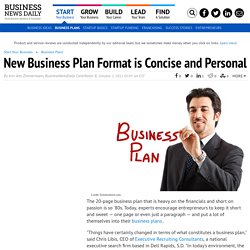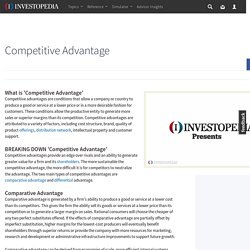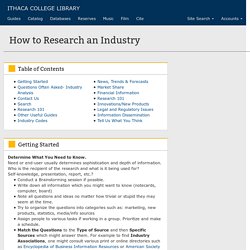

University of South Florida. New Business Plan Format is Concise and Personal. Credit: Dreamstime.com The 20-page business plan that is heavy on the financials and short on passion is so '80s.

Today, experts encourage entrepreneurs to keep it short and sweet — one page or even just a paragraph — and put a lot of themselves into their business plans . "Things have certainly changed in terms of what constitutes a business plan," said Chris Libis, CEO of Executive Recruiting Consultants, a national executive search firm based in Dell Rapids, S.D. "In today's environment, the traditional business plan will bankrupt you. " Keep it simple Libis said business plans, including the one he developed for his own business, should be concise and to the point.
Unlike traditional business plans, modern business roadmaps should embrace new media, he said. "Consider a three- to five-minute video that you can post on YouTube," he said. A YouTube video is just one way an entrepreneur can put technology to work for your business plan. "Who will be reading your plan? " Customer focused. Competitive Advantage Definition. Comparative advantage is an economic law referring to the ability of any given economic actor to produce goods and services at a lower opportunity cost than other economic actors.

The law of comparative advantage is popularly attributed to English political economist David Ricardo and his book “Principles of Political Economy and Taxation” in 1817, although it is likely that Ricardo's mentor James Mill originated the analysis. BREAKING DOWN 'Comparative Advantage' One of the most important concepts in economic theory, comparative advantage lays out the case that all actors, at all times, can mutually benefit from cooperation and voluntary trade.
How to Research an Industry. You will want to get an general understanding/overview of the industry you are researching.

The following are some of the best sources available: Standard & Poor's Industry Surveys (found in Reference), or by going to Business Insights: EssentialsIndustry Search, putting in the name of the industry or searching by SIC/NAICS code and choosing Industry Overview or Market Research (tabbed headings). Look at the list of questions below and their corresponding sources (found in the sidebar) Industry Codes ( or NAICS (North American Industrial Classification System) ). Having the code for the industry enables one to find companies in the same industry by using various print and online directories. See sidebar on Industry Codes on how to find them. Have a Business Idea? 6 Ways to Research Your Industry.
In their book, Start Your Own Business, the staff of Entrepreneur Media, Inc. guides you through the critical steps to starting a business, then supports you in surviving the first three years as a business owner.

In this edited excerpt, the authors explain what secondary market research is and the different sources you can use to gather it. When conducting market research for your new business, you'll gather two types of data: primary and secondary. Primary research is information that comes directly from the source—that is, potential customers. Secondary research involves gathering statistics, reports, studies, and other data from organizations such as government agencies, trade associations, and your local chamber of commerce. The vast majority of research you can find will be secondary research, plenty of which is available for free to entrepreneurs on a tight budget. Reference librarians at public and university libraries can point you in the right direction.
How do I research an industry?, Business Plans Article. Writing a Business Plan mentor Rhonda Abrams responds to the following question frequently asked by inc.com users:I'm planning a new business and finding a lot of general information about starting a business.

Where do I find specific data that applies to my particular industry -- information about topics such as suppliers, market research, typical expenditures, etc.? Rhonda Abrams responds:The further you get into starting (and running) your business, the more you need specific, detailed information that relates to your particular needs. This info can be hard to locate, but a lot more exists than you'd imagine. Start with the trade associations serving your industry (and related industries, such as suppliers or distributors). There are thousands of trade industries and professional associations; I'm betting that your industry is covered by at least one. On the Web, go to the American Society of Association Executives' Gateway to Associations.
Go to a number of sites and look around.